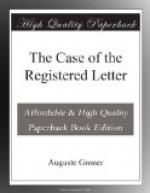Eleonora clasped her hands and her lips moved as if in silent prayer. Then she rose slowly and held out the letters to Muller. “Do what you will with them,” she said. “My strength is at an end.”
The next day, in the presence of Commissioner Lange and of the accused Albert Graumann, Muller opened the letter which he had received from Miss Roemer and read it aloud. The girl herself, by her own request, was not present. Both Muller and Graumann understood that the strain of this message from the dead would be too much for her to bear. This was the letter:
G.— September 21st.
My beloved:
When you put this letter in the hands of the Judge, I will have found in death the peace that I could never find on earth. There was no chance of happiness for me since I have realised that I love you, that you love me, and that I must give you up if I am to remain what I have always been—in spite of everything—a man of honour.
Albert Graumann would keep his word, this I know. Wherever you might follow me as my wife, there his will would have been before us, blasting my reputation, blackening the flame which you were to bear.
I could not have endured it. My soul was sick of all this secrecy, sick at the injustice of mankind. In spite of worldly success, my life was cold and barren in the strange land to which I had fled. My home called to me and I came back to it.
I kissed the earth of my own country, and I wept at my mother’s grave. I was happy again under the skies which had domed above my childhood. For I am an honest man, beloved, and I always have been.
One day I sat at table beside the man—the Judge who condemned me, here in G— in those terrible days. He naturally did not know me again. I, myself, brought the conversation around to a professional subject. I asked him if it were not possible that circumstantial evidence could lie; if the entire past, the reputation of the accused would not be a factor in his favour. The Judge denied it. It was his opinion, beyond a doubt, that circumstantial evidence was sufficient to convict anyone.
My soul rose within me. This infallibility, this legal arrogance, aroused my blood. “That man should have a lesson!” I said to myself.
But I had forgotten it all—all my anger, all my hatred and bitterness, when I met you. I dare not trust myself to think of you too much, now that everything is arranged for the one last step. It takes all my control to keep my decision unwavering while I sit here and tell you how much your love, your great tenderness, your sweet trust in me, meant to me.
Let me talk rather of Albert Graumann. I will forgive him for believing in my guilt, but I cannot forgive him that he, the man of cultivation and mental grasp, could not believe it possible for a convicted thief to have repented and to have lived an honest life after the atonement of his crime. I still cannot believe that this was Graumann’s opinion. I am forced to think that it was an excuse only on his part, an excuse to keep us apart, an excuse to keep you for himself.




